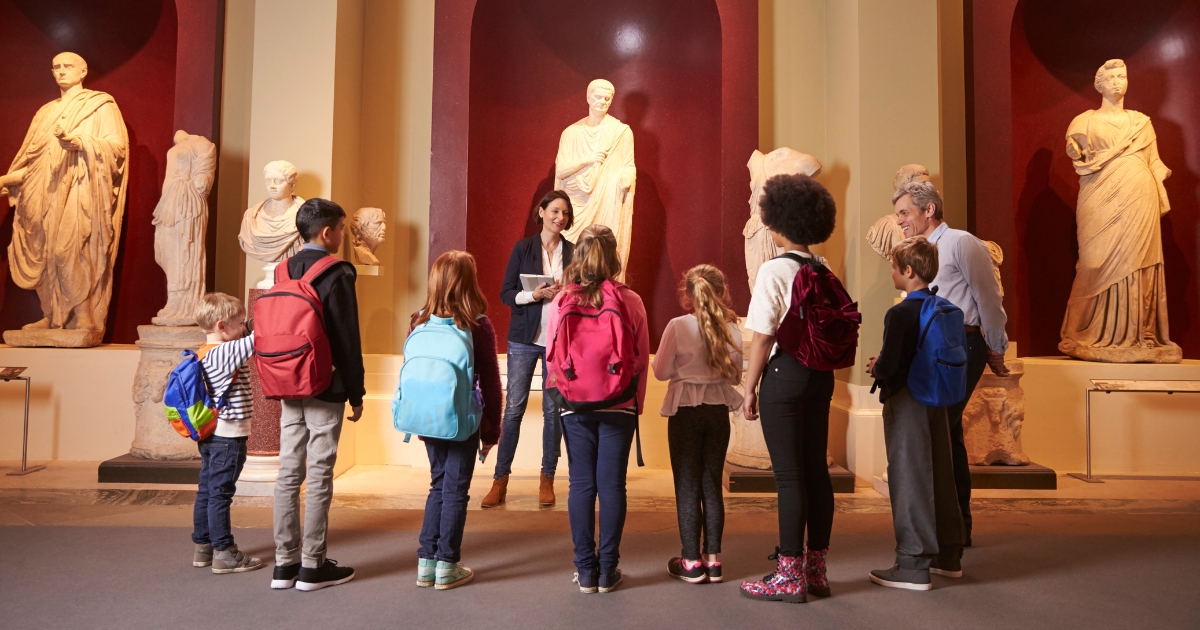Homeschooling offers a unique opportunity for parents to customize their children’s education. Yet, even the most engaging lesson plans can benefit from a change of scenery. That’s where the magic of field trips comes in. By incorporating field trips into your homeschool routine, you can breathe new life into your educational approach, making learning more dynamic and memorable for your kids.
In this blog post, we’ll explore why field trips are invaluable for homeschoolers, how to plan and integrate them effectively and share some inspiring ideas to get you started. If you’re a homeschool parent wondering how to add more excitement to your lessons, read on to discover the benefits of field trips for homeschool kids, taking kids on field trips and how it can transform your homeschool experience.
The Power Of Experiential Learning
One of the greatest advantages of homeschooling is the flexibility it offers. Unlike traditional schools, homeschool parents can adapt their teaching methods to suit their children’s unique learning styles. Experiential learning, where kids learn through hands-on experiences, is one of the most effective ways to deepen understanding and retention. Field trips provide the perfect platform for this type of learning.
When you take children out of their usual learning environment, they encounter new sights, sounds, and experiences that stimulate their minds in different ways. For example, a visit to a science museum offers the chance to see exhibits and demonstrations that bring textbook concepts to life. The interactive nature of these experiences not only makes learning fun but also helps children grasp complex topics more easily. This kind of immersive learning is hard to replicate within the confines of a home classroom. Additionally, field trips help to break the monotony of daily routines. When children know that a field trip is on the horizon, it builds anticipation and excitement. This can be a powerful motivator, encouraging them to engage more deeply with their studies in preparation for the trip. The break from routine also helps to prevent burnout, keeping both parents and kids refreshed and enthusiastic about learning.
Field trips are not just about academic enrichment; they also play a vital role in social and emotional development. Homeschooling can sometimes be isolating, with fewer opportunities for children to interact with peers compared to traditional schooling environments. Taking kids on field trips opens up avenues for socialization, allowing them to meet and interact with other homeschool families or members of the general public at various venues. These interactions are crucial for developing social skills. For instance, children learn how to communicate effectively, work collaboratively, and practice good manners in public settings. They may also encounter situations that require problem-solving or adapting to new environments, which helps build resilience and confidence. The social aspects of field trips can be particularly beneficial for children who are shy or have difficulty making friends, providing them with low-pressure opportunities to engage with others.
Beyond social skills, field trips can also enhance emotional well-being. The excitement and novelty of visiting new places can boost mood and reduce stress. These positive emotions contribute to a more conducive learning environment when children return to their regular studies. Furthermore, field trips often involve physical activity, whether it’s walking through a zoo, hiking in a nature reserve, or engaging in hands-on activities at a historical site. Physical exercise is known to improve mental health, making field trips a holistic way to support your child’s overall development.
Planning And Integrating Field Trips Into Your Curriculum
Successfully incorporating field trips into your homeschool routine requires thoughtful planning. The first step is to align the field trips with your curriculum goals. Consider what subjects or topics you are currently covering and look for field trips that can complement and enhance these lessons. For example, if you’re studying marine biology, a trip to an aquarium would provide a practical extension of what your children have learned at home. Once you’ve identified potential field trips, it’s important to prepare your children for what they will experience. Provide them with background information and discuss what they should look out for during the trip. This preparation helps to maximize the educational value of the outing.
You can also create worksheets or scavenger hunts to guide their exploration and ensure they remain engaged. Logistics are another crucial aspect of planning. Consider factors such as travel time, costs, and any special requirements for the destination. Some places may require advance booking or have restrictions on group sizes. It’s also a good idea to check for any available discounts or special programs for homeschool families, as many venues offer these to encourage educational visits. After the field trip, reinforce the learning by discussing what your children observed and learned. Encourage them to express their thoughts through activities such as journaling, creating presentations, or engaging in follow-up projects. This reflection helps to consolidate their understanding and provides a way to assess the educational impact of the trip.
Inspiring Field Trip Ideas
The possibilities for enriching field trips are vast and varied. Here are some ideas to inspire you as you plan your next adventure:
- Museums and Science Centers: Museums and science centers are treasure troves of knowledge and interactive learning. From natural history and art museums to specialized science centers, these venues offer exhibits and activities that cater to a wide range of interests. Many museums also have programs specifically designed for homeschool groups, including guided tours and hands-on workshops.
- Nature Reserves and Parks: Nature reserves and parks provide an excellent opportunity for children to learn about ecology, biology, and environmental science. Activities such as guided nature walks, bird watching, and plant identification can make these trips both educational and enjoyable. Additionally, spending time outdoors promotes physical health and a deeper appreciation for the natural world.
- Historical Sites and Landmarks: Visiting historical sites and landmarks can bring history lessons to life in a way that textbooks cannot. Whether it’s a local heritage site, a battlefield, or a colonial village, these trips offer a tangible connection to the past. Children can see artifacts, explore reconstructed buildings, and participate in reenactments that help them understand historical events and contexts.
- Farms and Zoos: Farms and zoos offer a closer look at animal biology, agriculture, and conservation. Farm visits can teach children about where food comes from, the importance of sustainable practices, and the daily operations of a working farm. Zoos, on the other hand, provide insights into animal behavior, habitats, and conservation efforts, with many offering educational programs and interactive exhibits.
- Theaters and Art Studios: For those interested in the arts, visiting theaters and art studios can provide inspiration and practical knowledge. Attending a live performance, whether it’s a play, a musical, or a dance recital, exposes children to the performing arts and the hard work that goes into creating a production. Art studios and galleries offer opportunities to see artists at work, learn about different techniques, and possibly even participate in workshops.
To reap the full benefits of field trips, it’s also essential to make them a regular part of your homeschool routine rather than occasional treats. Aim to incorporate at least one field trip per month, adjusting the frequency based on your schedule and resources. Consistency helps to build the habit of experiential learning and keeps the educational experience fresh and exciting for your children. Consider forming a co-op with other homeschool families to share the planning and execution of field trips. This collaboration not only spreads the workload but also provides additional social opportunities for your children. It also allows you to take advantage of group discounts and special programs that are often available to larger groups.
A Powerful Way To Enrich Your Child’s Education
Incorporating field trips into your homeschool routine is a powerful way to enrich your children’s education. These outings offer hands-on learning experiences, boost social and emotional development, and keep the educational process exciting and engaging. With careful planning and a bit of creativity, you can seamlessly integrate field trips into your curriculum, making the most of the flexibility that homeschooling provides. By taking kids on field trips regularly, you’ll not only enhance their academic knowledge but also foster a love for learning that extends beyond the classroom. Whether it’s a visit to a museum, a hike in a nature reserve, or a tour of a historical site, each trip will provide valuable lessons and unforgettable memories. Start planning your next field trip for homeschooled kids today and watch as their curiosity and enthusiasm for learning soar.




